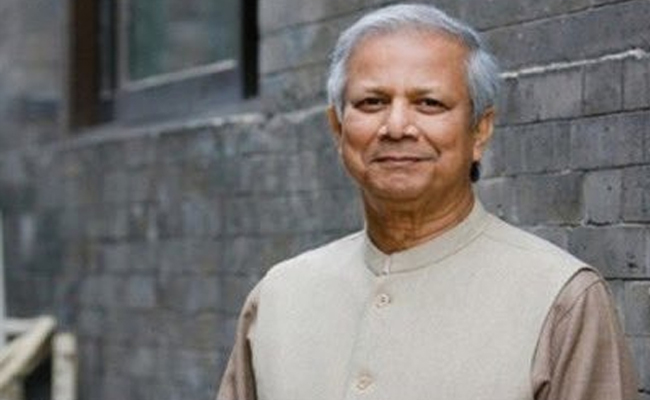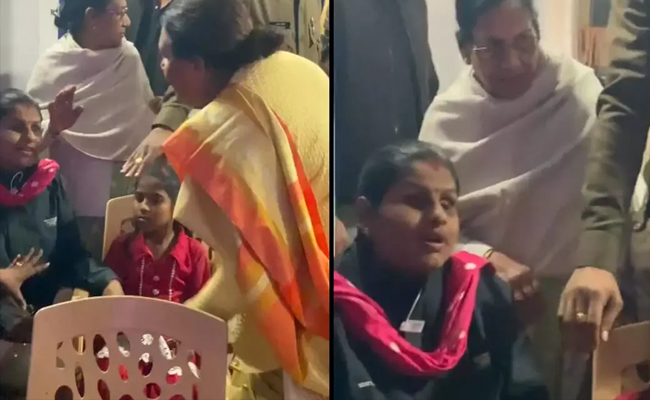Dhaka (PTI): Bangladesh's Nobel laureate economist Dr Muhammad Yunus was on Monday sentenced to six months in jail by a court on charges of violating the labour laws, a development termed as "politically motivated" by his supporters ahead of the general elections.
The 83-year-old economist won the Nobel Peace Prize in 2006 for his anti-poverty campaign, earning Bangladesh the reputation of being the home of microcredit through his Grameen Bank, which he founded in 1983.
Yunus and three of his colleagues in Grameen Telecom-- one of the firms he founded-- were accused of violating labour laws when they failed to create a workers' welfare fund in the company.
The Third Labour Court Judge Sheikh Merina Sultana ordered Yunus to serve six months of simple or non-rigorous imprisonment for violating the law as the Grameen Telecom chairman, along with three other executives of the social business company.
"The allegation of violating the Labour Law against him has been proved. It appears that the allegation has not been barred by limitation (either)," the judge said, pronouncing the judgment while Yunus was in the dock.
She also slapped a Taka 25,000 fine (USD 227.82) on each of them, adding that they would have to serve 10 more days in jail in case of a default.
Soon after the judgment was passed, Yunus and the three other executives sought bail, which the judge granted immediately for a month in exchange for a Taka 5,000 bond.
Under the law, all four can appeal against the verdict in the High Court.
The verdict comes just days ahead of the January 7 general election in Bangladesh.
His supporters have described the judgment as "politically motivated".
Last month, after a court appearance for the hearing, Yunus rejected claims of profiting from Grameen Telecom or any of the more than 50 social business firms he founded in Bangladesh. "They were not for my personal benefit," he told reporters.
His lawyers called the case "meritless, false and ill-motivated" and claimed it was only aimed to harass and humiliate Yunus before the global community.
The Nobel laureate is also facing a series of charges relating to labour law and misappropriation of money.
The economist was on a protracted row with the incumbent government due to obscure reasons. The Sheikh Hasina-led administration began a series of investigations against him after coming to power in 2008.
Bangladesh authorities began a review of the statutory Grameen Bank's activities in 2011 and fired Yunus as its founding managing director on charges of violating the government retirement regulations.
Many people believe that Hasina became enraged when Yunus announced he would form a political party in 2007 when the country was run by a military-backed government, and she was in prison.
However, Yunus did not follow through on the plan but criticised politicians in the country, alleging they were only interested in making money.
Hasina's government began a review of the Grameen Bank's activities in 2011 and fired Yunus as its founding managing director on charges of violating government retirement regulations.
He was put on trial in 2013 on charges of receiving money without government permission, including his Nobel Prize award and royalties from a book.
Hasina called Yunus a "bloodsucker" and accused him of using force and other means to recover loans from poor rural women as head of Grameen Bank.
He was later granted bail after his court appearance.
After his prolonged efforts to settle disputes with the government, Yunus blasted the government for paving the way for the "destruction" of the pioneering micro-lending bank he founded.
In August 2023, 18 former Grameen Telecom workers filed a case against Yunus, accusing him of siphoning off their job benefits.
Separately, Yunus went on trial in August 2022 on charges of violating labour laws.
The economist and 13 others were also named in a case brought by the Anti-Corruption Commission accusing them of embezzling funds from Grameen Telecom.
In August last year, more than 170 global leaders and Nobel laureates sent an open letter to Prime Minister Hasina urging her to suspend legal proceedings against Yunus.
The signatories included former US President Barack Obama, former UN Secretary-General Ban Ki-moon and more than 100 Nobel laureates.
Let the Truth be known. If you read VB and like VB, please be a VB Supporter and Help us deliver the Truth to one and all.
Jabalpur: Anju Bhargava, vice-president of BJP's Jabalpur city unit, has come under sharp scrutiny, creating the ripples of political controvery in Madhya Pradesh, after a video surfaced online showing her physically assaulting a visually impaired woman inside a church.
The New Indian Express has reported that the said incident reportedly took place on Saturday (20 Dec) at a church in the Hawa Bagh area, which comes under the limits of Gorakhpur police station.
The video footage that has circulated widely on Monday shows Anju Bhargava, assaulting the blind woman in the presence of a police officer. In the video, Bhargava is seen shouting at the woman, twisting her arm and forcibly grabbing her face. The victim can be heard pleading to Bhargava to speak to her rather than resorting to physical violence. Also, we can hear Bhargava screaming, “will be blind in her next birth too”
ALSO READ: Woman arrested for theft, stolen gold articles worth Rs 32 lakh seized
According to The Indian Express reports, Bhargava entered the church, with members of several Hindutva affiliated organisations, alleging that the visually impaired children were being forced into religious conversion; But, the students present at the church have flatly denied all the allegations.
An unnamed police officer cited in media reports states that there was no evidence to support claims of forced religious conversion. The incident has since intensified political debate in the state, with opposition parties demanding accountability and action against those involved.





